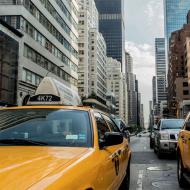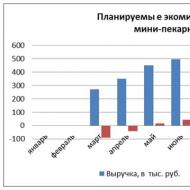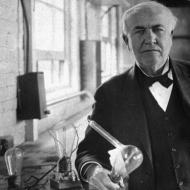
Journey into space (event for Cosmonautics Day). Extra-curricular event for primary schools dedicated to Cosmonautics Day “Trip to the country of cosmonautics Games for Cosmonautics Day in primary school
When planning an event and scenario for Cosmonautics Day, the main attention should be paid to the variety of its elements - it should be interesting for children. This holiday is held taking into account the characteristics of each age category of schoolchildren.
Junior classes
Young children should not be overloaded with information about space exploration. Events should contain more active and logical games. You can invite children to create decorations for the holiday with their own hands: toys, drawings, crafts dedicated to Cosmonautics Day.
For students in grades 1-4, information should be presented in a playful way. Only in this case will the holiday be remembered for a long time and will evoke many positive emotions.
You can select several children from the class and assign roles for them, let them learn short poems. This will help to involve the kids in the event and increase the degree of their participation in the celebration.
High school
Older students will find it more interesting to perceive information using media presentations and slide shows. Competitions must also be present in the scenario describing Cosmonautics Day. The class hour will be active and interesting.
It is preferable for high school students to present more serious, in-depth information on the topic of the event. You can pay attention to the biographies of legendary cosmonauts, the main events on the path to space exploration, etc.
High school students should also take an active part in holding events for Cosmonautics Day. This could be a form of work such as distributing roles between children or preparing information on a given topic. The main thing is that it is original and dynamic. Don't delay the event too much.
Motivation of children
When planning Cosmonautics Day, the script should begin with the introduction and motivation for holding this event. This can be done independently or with the participation of child leaders.

It is imperative to pay attention to the question of why April 12 is celebrated as a national holiday. It is necessary to talk about the feat of Yuri Gagarin, who opened the way for humanity to the stars, to convey information to children in a form accessible to their age.
You can talk about the events that preceded the first flight into space, after which people began to celebrate Cosmonautics Day. The year 1957 marked the beginning of the era of human exploration of space beyond our planet.
Competitions and games for Cosmonautics Day for primary schoolchildren
There are many competitions that are held on this day. Little children will have a lot of fun imagining themselves as cosmonauts of an ultra-modern interplanetary spacecraft and learning about the life of astronauts. To do this, it is recommended to hold a competition “Cosmonaut Breakfast”. Several apples are tied on a string and children are invited to eat the fruit without touching them with their hands. Almost like being in zero gravity. The winner is the one who eats his “breakfast” the fastest.

The "Real Cosmonaut" competition will allow everyone to take part in the game. To carry it out, a rope or tape is placed on the floor. Before starting their route, each competitor turns around himself 5 times (representing overcoming the overloads when entering orbit), and then tries to walk in a straight line without leaving the path.
It is very good if before the celebration a system of rewards and incentives for participants was thought out.
Thematic creative works
The Space Artists competition will also add variety to the school Cosmonautics Day. Crafts made by children should tell about comets, astronauts, and starships. This will promote the development of creativity and will bring a lot of positivity to the class hour dedicated to Cosmonautics Day.

You can also offer to build a rocket on which the children will all go on an imaginary flight to the stars. Before the event, it will be interesting to invite children to prepare a musical number on a space theme. Such a performance will become a vivid memory for both participants and spectators.
Thematic techniques in high school
When writing a script for Cosmonautics Day for older students, you can pay attention to such forms of active participation of children in the event as quizzes, slide shows and pre-prepared speeches.
When spending Cosmonautics Day at school, you can invite children to divide into 2 groups, choose names for them and take part in the game “Greetings from Space”. Students must write a message from astronauts from the depths of the universe using the letter "P". The letter should be informative and original. Whose message is longer, that team wins.
Everyone present will enjoy a pre-prepared musical performance by one or more participants. The performance is rehearsed by the children in advance, and appropriate costumes can be made.
Games for high school students for Cosmonautics Day
Another interesting competition is called "Meteor Shower". The spaceships came under attack from asteroids. Each team member must show composure and mutual assistance to avoid collisions with destructive objects.
It is necessary to give the correct answer “yes” or “no” to the question posed in order to protect the ship’s crew from an accident.
The presenter asks questions on space topics. For example:
- Yu. A. Gagarin flew around the Earth in 1 hour 48 minutes? (Yes)
- Is the sun smaller than the earth? (No)
Each “accurate” answer adds 1 point to the team and helps its spaceship avoid a collision with a meteorite.

More active competitions are allowed. When celebrating Cosmonautics Day, events of this type should be placed next to passive forms of work.
The game "Rocket" will bring great excitement to the classroom. To do this, two couples are invited to take part in the construction of an interplanetary spacecraft. It is advisable if it is a tandem “boy and girl”. The student raises his hands and puts his palms together, representing a rocket. The student begins to wrap a paper towel around him without covering her face (leaving the porthole for the astronaut). The couple that completes the task faster receives a reward and the title of Chief Designer.
Material for the event
Cosmonautics Day at school should be designed accordingly, so it is necessary to prepare theoretical material.
You should bring a portrait of Yu. A. Gagarin, materials for competitions, select appropriate musical accompaniment and slides. You can decorate the room thematically, for example with stars, posters with drawings prepared by students, etc.
If you plan to present a theory, you can use a projector or special slides to present visual material. Interesting facts about the space industry, the space of the Universe and other information will also be interesting for children to listen to.

The biographies of the legendary cosmonauts Yu. A. Gagarin, G. S. Titov, V. V. Tereshkova will become an example for the younger generation. They achieved their goal thanks to strength of character, perseverance, and devotion to the Motherland.
A well-planned Cosmonautics Day at school will be a real event for all participants. This event will be remembered for a long time. Taking into account the age characteristics of children, holding Cosmonautics Day every year will develop in schoolchildren team spirit, a sense of respect, patriotism, as well as creative thinking, imagination, and the ability to express their thoughts. The holiday will bring a lot of bright impressions and positive emotions.
Space holiday for primary school students (material for the holiday in honor of the flight of the first cosmonaut Yu. A. Gagarin)
April 12 ___ marked _____ years since the flight of the world's first cosmonaut Yu. A. Gagarin.
Cosmonautics Day is a major national holiday in honor of pilots, cosmonauts, designers, employees, and workers who create rockets, spaceships, and artificial Earth satellites.
Cosmonautics Day can be celebrated in a variety of ways. These can be: literary and musical composition; travel game “Schoolboy, don’t forget, you’re on your way to becoming an astronaut”; game program “The door to space is open to everyone, come on, check yourself!”; drawing competition on the theme “An astronaut flies and carries the baton of his homeland over the entire planet!”; competition of poems and songs about space; conversations on the topics “From student rockets to space rockets”, “Fairy tale becomes reality”.
We offer an approximate version of the holiday using literary and musical compositions and gaming competitions.
The celebration can take place in the school assembly or sports hall. The design of the hall uses slogans: “You can’t live well, you need to live with passion” (S.P. Korolev), “We all want to go to the Moon,” “If you want to become an astronaut, you need to know a lot,” “Cosmonauts are growing up among us.” "
On the stage are portraits of Yu. A. Gagarin, K. E. Tsiolkovsky, S. P. Korolev. Portraits of other astronauts are in the hall. The children's uniform is athletic; it is advisable to arrange the chairs in a semicircle to leave a clear area in front of the stage.
The progress of the holiday
The presenters take the stage.
1st presenter. We dedicate our holiday to the first flight of the world's first cosmonaut Yu. A. Gagarin.
On the screen are stills from a movie or filmstrip.
2nd presenter. Moscow speaks! All radio stations of the Soviet Union are working! Moscow time - 10 hours 2 minutes. We are transmitting a message about the world's first human flight into outer space.
On April 12, 1961, the world's first spacecraft-satellite Vostok with a person on board was launched into orbit around the Earth in the Soviet Union.
The pilot-cosmonaut of the Vostok spacecraft is a citizen of the Soviet Union, pilot Yuri Alekseevich Gagarin.
Reader.
Dawn doesn't mean anything yet
The usual “Latest news”.
And he is already flying through the constellations,
The earth will wake up with his name.
“My native country is wide”...
We start our reports with them.
And it’s not for nothing that I remember this.
Without asking anyone for help,
Having risen from the ashes and from the dust,
My country, which knows no fear,
Now he is sending his son into space!
K. Simonov
Leading. The world held its breath. The world listened to the voice of a man flying over oceans and countries, and people in these countries repeated: “Ga-ga-rin”, “Yuri”, “USSR”. The earth recognized the man who paved the way to the stars. A simple, charming person. He became the hero of the whole Earth. This is how the word “cosmonaut” appeared. (On the screen is a portrait of Yu. A. Gagarin.)
Reader.
We live on our planet
In such a wonderful age.
And the first of the first in the rocket
Soviet man is flying!
Not for military intelligence purposes
On a super-fast ship
He flew alone through the Universe,
To return to the Earth again!
It was not in vain that skillful hands worked
For the glory of the people, for the glory of the country!
Working people and people of science
We are strong in a peaceful Commonwealth!
S. Mikhalkov
Song “VISITING THE STARS”(lyrics by M. Plyatskovsky, music by S. Tulikov)
1. Distant stars in the sky are burning,
They invite the October boys to visit.
It won't take long for us to get ready for the journey -
And now we are ready to fly.
2. The announcer will command: “Attention - take off!” -
And our rocket will rush forward.
They will blink farewell and melt into the distance
Golden lights of the beloved Earth.
3. We want to make friends with you, Luna,
So that you don't get bored all the time alone!
Mysterious Mars, wait for us a little,
We'll be able to stop by and see you on the way!
1st presenter. Yu. A. Gagarin paved the way to the stars. He was the first, which is why he is called a space pioneer.
2nd presenter. Many years have passed since the start of Yu. A. Gagarin. During this time, a lot has changed in astronautics: technology, crew training, and the program of work in orbit.
3rd presenter. Work in space now takes a long time. New ships are launched, orbital stations are circling the planet. One expedition is leaving for the sky, another is preparing for flight. Courageous people, heroes, work in space!
4th presenter. Look, guys, at these faces! (Portraits of astronauts are projected on the screen and their names are called.)
Reader.
Rockets are rushing to distant worlds,
The heart yearns for exploits...
Who believes dreams that fly like a song,
He will achieve his goal!
N. Dobronravov
1st presenter. The first cosmonauts were pilots. Then designers and doctors continued working in space. Now space is calling for those who know how to operate electronic computers, melt metal, and carry out installation and unloading work.
2nd presenter. And the working conditions of the astronauts became different. “On my first flight, I couldn’t even shave, but there was a real bathhouse on board the Salyut” (from the story of A. Nikolaev).
3rd presenter. Today, work in space means scientific research and everyday work for the sake of progress throughout the world. That is why international crews began to fly into space.
Reader.
The roads are clear for our scientists
They will be in the darkness of space,
But these roads are only needed then,
For a better life on Earth.
Let's pave the way to distant worlds,
We'll fly in rockets to the moon,
And if we meet our peers there,
Then we’ll invite you to visit us.
From the song “Star Road” (lyrics by G. Selyanin, music by A. Fattah)
1st presenter. If you ask our cosmonauts where the road to space began, you will certainly hear the answer: “With a dream.”
2nd presenter. A dream becomes reality if a person is hardworking, inquisitive and persistent.
1st student.
We hurry to school quickly,
To our favorite class.
Lots of big and new things to do
They are waiting for us.
There will be a day, dear light
We will fly too -
To the secret, fabulous planets,
To distant worlds.
2nd presenter. Guys! Do you want to go to space? (Yes.)
2nd student.
If we want to go into space,
So, we'll be flying soon!
Ours will be the most friendly,
Our cheerful crew!
Reader(via microphone behind the stage). Attention! Attention! The control panel speaks. We are in the area of the launch pad of the Druzhba cosmodrome. The first passengers arrived here, participants in the first passenger flight “Earth - Mars - Moon - Earth”. The participants of the flight have passed difficult tests and will now show us their readiness No. 1.
(Groups of guys (teams) take turns and unanimously pronounce the name of the rocket, their motto. The names of the rockets can be different: “Friendship”, “Starship”, “Space”, “Brave”, etc.)
1st student. The team is ready to fly! Commander (student's first and last name).
Leading. During flight, every astronaut must follow space rules. I will name the beginning of the rule, and you all must continue it together. So...
Student, don't forget
All. You're on your way to becoming an astronaut!
Leading. Our main rule is
All. Follow any order!
Leading. Do you want to become an astronaut -
All. Must know a lot, a lot!
Leading. Any space route
All. Open to those who love work!
Leading. Only friendly starships
All. You can take it with you on a flight!
Leading. Bored, gloomy and angry
All. We won't take it into orbit!
Leading. Well done boys! Which rocket will take off first? This will be decided by a counting rhyme (done with team captains).
Reading book "ROCKET"
Flew in a rocket
On a distant
There was a planet.
Had lunch there
In the blue
And in the evening
I was in Moscow.
From a rocket
Toy, friends,
The very first
The student on whom the last word “I” falls, along with the team, is the first to take a place in the rocket. The rocket launch is accompanied by sound effects recorded on film.
Leading. Attention! Attention! Everyone get ready to launch! Fasten belts!
Commander. Fasten your seat belts!
Leading. Start the engines!
All. Got to start the engines!
Leading. Enable contacts!
All. There are enable contacts!
Leading. Five, four, three, two, one - start! (The sound of a rocket taking off is heard.)
Leading.
The rocket rises
Draws the sky with bright light.
We found ourselves in orbit.
All. Hooray! Hooray! Hooray! Let's fly!
Teams take their assigned places and are offered competitions.
Relay game “What will we take with us into space.”
Two sets of drawings depicting the following items are laid out on the floor: a book, a notepad, a fountain pen, a spacesuit, a cat, an apple, a tube of semolina porridge, a tube of cake, a photograph of a child, an alarm clock, and sausage.
During the relay, each player must take one picture depicting what an astronaut can actually take with him to the spaceship.
Competition “The door to space is open to everyone,
Come on, check yourself!”
The proposed questions should be discussed with the children in advance.
1. When is Cosmonautics Day celebrated (name the day and month)?
2. Can Yuri Gagarin be called a pioneer, why?
3. Name domestic female cosmonauts.
4. Who was the first astronaut to go into outer space?
5. What professions have been to space?
6. Why were several ship crews called international?
7. What is the name of the city where astronauts live and work?
8. Where is the launch pad from which spaceships launch?
Leading. Now we will check the health of our players during the first minutes of the flight.
Each team has 5 boys and 5 girls. Boys and girls work in pairs. At the presenter’s signal, the boy inflates the balloon, the girl helps to tie it. Then you need to quickly tie all the threads from the balls. One of the players of the team that completed the task faster raises a bunch of balls above his head.
Relay race “Who is most likely to form the word “COSMONAUT”?
The presenter gives the players cards measuring 20 X 30 cm with letters written on them. The cards are arranged randomly, shuffled and turned upside down. At the signal “Three, two, one - start!” Team players turn the cards upside down and quickly form the word “COSMONAUT”.
Relay "Weightlessness".
On one side of the hall, near the starting line, the guys are holding a baton with the inscription “Earth”. On the opposite side of the hall, the guys have wands with the inscriptions “Mars” and “Venus”. Between the planets Earth, Mars, and Venus, at an equal distance, there are three large hoops, inside of which there is the inscription “weightlessness.”
The presenter learns poetry with the guys:
Fast rockets are waiting for us
For walks to the planets.
Whatever we want
We'll fly to this one.
But there is one secret in the game:
There is no room for latecomers!
Once! Two! Three!
After these words, the player standing first runs forward, but, having encountered “weightlessness” on the way, he must jump around each hoop circle on one leg. When one player reaches the planet Mars or Venus, the next player starts, and so on.
The team that is the first to line up near the planet Mars or Venus wins.
The presenter records the time and at the end announces the result.
Competition "Space Dictionary".
Blank sheets of Whatman paper are attached to both sides of the board. On each of them there is the inscription “Cosmic Dictionary” at the top.
The presenter invites the team players to take turns running to the board and writing under one word related to flight. For example: satellite, spacesuit, cosmodrome, lunar rover, rocket, etc. Game time is 3-5 minutes. The team that writes the most and most correct words wins.
Competition "Name the astronauts."
Everyone participates in the competition. To the sound of music, a “magic” wand is passed around the hall from one to another. Whoever gets it into his hands must quickly name the name of the astronaut or the ship on which he flew. The team that names the most names and ships wins.
Leading. Guys, now guess the riddles.
1. Floats boldly in the sky,
Overtaking the birds in flight,
Man controls it.
What is it?... (Starship.)
2. There are no wings, but this bird
It will fly and land on the moon. (Lunokhod.)
So, we became astronauts. What qualities can you name that are necessary for an astronaut? What should an astronaut be like? (Brave, honest, resourceful, inquisitive, educated, modest, smart, kind, friendly.)
Leading. Guys! You all passed the tests well, during the flight you proved that you know and can do a lot, and most importantly, you acted together and helped each other. Now we are returning to Earth. (The sound of a rocket being launched is heard.)
Leading. Attention! Everyone get ready to descend!
Children. Get ready to descend!
Summarizing. Rewarding.
Performance of the common song “14 minutes before the start”.
Additional material
Song “OUR Merry CREW”
(lyrics by P. Sinyavsky, music by Y. Chichkov)
1. Like on the field of a cosmodrome
We run out into the yard.
Let's get down to business together:
From the swing near the house
We need to make a simulator
You need to get used to weightlessness.
Chorus:
If we want to go into space,
So, we'll be flying soon,
Ours will be the most friendly,
Our cheerful crew.
2. If we don’t have a spacesuit,
To go on a flight -
We can make it.
We got glass from an old headlight
Suitable for a spacesuit
And a cardboard box too.
Chorus:
3. Why aren’t we astronauts?
If each of us
Do you even dream about the orbital complex?
And we agree even tomorrow,
Even today, even now
Ride a rocket into space.
Chorus:
GAGARIN ON EARTH
You will say: “Gagarin!” - and suddenly in front of us
He rushes upward, drawn by a whirlwind,
Promethean flames shooting up into the sky,
The steppe is deafening with enthusiastic thunder.
You will see how inspired he is
The golden thread is lowered in turns,
The ball flying around and the strings of the Universe
Touching in bold flight with your hands.
I sense the interweaving of those invisible strings.
Rushes between them into immeasurable expanses.
Listen up! Singing flows into the heart -
He rushes, violating with his daring flight
There is eternal peace in the stellar Universe.
Sensitive star ears listen
Heartbeats and human sighs.
I see: the calmness of the eye under the eyebrow,
There is a glow of life in a clear smile.
One hears from the sky: “Your health is fine.
Glory to our dear Soviet fatherland!”
Our contemporary, he lived between us,
I was waiting for a new task from my homeland.
Loyal, always ready with friends
Towards new explorations of the secrets of the universe.
He is still between us, the living,
And the memory of the people will not die about him,
His name will forever remain in our hearts
A call and symbol of a bold takeoff!
A. Surkov
STAR SONG
(lyrics by V. Orlov, music by I. Arseev)
Cosmodromes thunder like distant thunderstorms,
The astronauts are looking at the blue ball,
And somewhere high stars shine,
That will be open to both me and you.
Nothing disturbs the expanses of the Fatherland,
The earth fell asleep and the city became silent...
And the Chief Designer finished,
may be,
Drawing of your and mine starships.
They are sailing somewhere on their own paths,
Now they don’t even know themselves
That they will be called by names,
And it is very possible - yours and mine.
The midnight stars descended to the bedside,
They call for you, ringing quietly.
The Motherland believes in us and looks at us with love,
And gives a smile to you and me.
Yu. A. GAGARIN
There are different dates. Some are remembered only by a few people, others are celebrated by all people. This is the date that April 12, 1961 refers to. From that festive morning, the habitation of space began. More and more powerful rockets are rising to the stars. But the further the year of man's first flight into space passes from us, the louder and more solemn the name of the pioneer of the Universe sounds. Everyone loved Yuri Gagarin. He has an ordinary biography. The grandson of a worker at the Putilov plant, the son of a peasant, a vocational school, a technical school, a flying club, a flight school - these are the milestones of his path. But Gagarin loved and knew how to work. And that's why he became a hero.
For centuries, people have dreamed of flying to the stars... In 1960, a series of flights of automatically controlled spacecraft were carried out, the “passengers” of which were animals.
Finally, on April 12, 1961, at 9:07 a.m. Moscow time, the Vostok spacecraft, with a man on board, launched from the Baikonur Cosmodrome in Kazakhstan. Having circled the Earth, the ship landed on the Volga land near Saratov. The world's first cosmonaut was Yu. A. Gagarin.
The night before the flight, Yuri slept for 8 hours and woke up cheerful and calm. He was sure that everything would be fine. Gagarin boarded the ship. The rocket's 20 million horsepower engines roared. The Vostok spaceship rushed upward. At an altitude of three hundred kilometers, Vostok entered orbit. He raced around the Earth at a speed of 28 thousand kilometers per hour. The flight lasted 108 minutes. The ship made a complete revolution around the Earth and smoothly descended in a given area. Thus began the era of manned space flights.
Summary of extracurricular activities on Cosmonautics Day for grades 3-4
Class progress
Teacher. Humanity has long strived for the stars. Since time immemorial, people have dreamed of flying to the Moon, to the planets of the solar system, to distant mysterious worlds.
A great event happened: for the first time in history, a person flew into space. We had the honor of being the first to penetrate into space. History will forever preserve the day of April 12, 1961.
The name of Yuri Alekseevich Gagarin became a symbol of courage and heroism, a symbol of the space age. And the further this memorable day is from us, the greater the greatness of the feat accomplished by the people.
Every step towards our cherished goal is dear to us.
Hearts are beating, orchestras are playing.
There are feats whose greatness
It’s not easy to see right away.
Another spaceship is taking off,
The inhabitants of the planet do not yet know
That a man is in space flight,
And the thunder of a rocket already taking off
Shook the steppe expanses of Kazakhstan.
What we have been waiting for for years has happened.
But even then they did not immediately realize
Our holiday is about the flight into space of the world's first cosmonaut - Yuri Alekseevich Gagarin.
Let's go back many years. A message is broadcast on the radio, and all over the country people have gathered around radios.
Moscow speaks! All radio stations of the Soviet Union operate Moscow time 10 hours 2 minutes. We transmit a TASS message about the world's first human flight into outer space,
On April 12, 1961, the world's first spacecraft-satellite Vostok with a person on board was launched into orbit around the Earth in the Soviet Union.
The pilot-cosmonaut of the Vostok spacecraft is a citizen of the Soviet Union, Yuri Alekseevich Gagarin.
Student.
Dawn. We didn't know anything yet.
The usual “Latest news”.
And he flies through the constellation.
The earth will wake up with his name.
Without asking anyone for help,
Having risen from the ashes and from the dust,
My country, which knows no fear,
He sends his son into space.
Teacher. Many years have passed since Yuri Gagarin's launch. During this time, a lot has changed in astronautics; and equipment, and crew training, and the program of work in orbit. They work in space for a long time now. The ships go into the sky one after another. Orbital stations circle around the planet.
Student.
Rockets are rushing to distant worlds,
The heart yearns for exploits,
Who believes dreams that fly like a song,
He will achieve his goal.
Teacher. Today, work in space means scientific research. That is why international crews fly into space, for example, cosmonauts from the Czech Republic, Cuba, Hungary, Poland, France, India and other countries have traveled to space together with our crews.
Student.
The roads are clear for our scientists
They will be in cosmic darkness.
But these roads are only needed then,
For a better life on Earth.
Let's pave roads to distant worlds,
We'll fly in rockets to the moon,
And if we meet our peers there,
Then we’ll invite you to visit us.
Teacher. More than once, astronauts were asked the question: where did their journey into space begin? There was only one answer: “From a dream.” A dream comes true only if a person is hardworking, inquisitive and persistent.
Student.
We hurry to school quickly,
To our favorite bright classroom.
Lots of things to do, big and new,
Waiting for us.
There will be a day, dear light
We will fly too -
To the secrets, fabulous planets,
To distant worlds.
Teacher. Guys, do you want to go to space?
Students.
Distant stars are burning in the sky,
They invite different guys to visit.
It won't take long for us to get ready for the journey -
And now we are ready to fly.
The announcer will command: “Attention - takeoff!”
And our rocket will rush forward.
They will blink farewell and melt into the distance
Golden lights of the beloved Earth.
We want to make friends with you, Luna.
So that you don't get bored all the time alone.
Mysterious Mars, wait for us a little.
We'll be able to stop by and see you on the way.
If we want to go into space,
So, we'll be flying soon!
Ours will be the bravest
Cheerful, friendly crew!
Teacher. During flight, each astronaut must follow special space rules. I will say the beginning of the rule, and you must all continue it together. So...
Astronaut, don't forget...
- You are on your way to deep space.
Our main rule is...
- Follow any order.
Do you want to become an astronaut...
- Must know a lot, a lot.
Any space route...
- Open to those who love work.
Only friendly starship...
- He can take it with him on a flight.
Boring, gloomy and angry...
- We won’t take it into orbit.
Teacher. To fly, we need a spaceship. Let's use the drawings that Dunno made.
Dunno came up with an interplanetary ship,
Drew drawings in a secret environment;
So that Vintik and Shpuntik don’t find out the secret,
I drew all the details on separate sheets of paper.
And look at all his drawings
And put together a complete drawing from the details.
Everything must be noticed, everything must be taken into account,
Perhaps there are unnecessary, superfluous ones?
Children put together a model of a spaceship from individual parts.
1st student.
You guys are rushing to your class,
Without studying, things won't work out.
Astronauts are growing among us,
But without knowledge they won’t take you to Mars!
You guys, get ready to fly!
Soon, soon the time will come,
When will the roads be open?
To the Moon, to Venus, to Mars!
2nd student.
People - adults and children -
Everyone dreams of one thing:
So that there is peace on the planet,
Like the sun outside the window!
3rd student.
When an astronaut flies above the earth,
Millions of children are looking after him.
In the evening they look to the heavens.
Children's eyes shine, shine.
And they are reflected in them, they burn brightly
Those stars to which they will fly!
Teacher. Guess the riddles.
There are no wings
But this bird will fly -
And he will lurk. (Lunnik.)
The metal itself
The brain is electric. (Robot.)
Wonder bird, scarlet tail,
Arrived in a flock of stars. (Rocket.)
There is a beautiful chest,
You can't touch him - he's silent.
And if you turn the handles,
He will talk and sing. (Radio.)
Inventor.
When I grow up a little, -
My friend told me, -
I will invent for my mother
Table cover.
Then I'll make a drawing... -
Said the inventor.
And what else will you invent?
Lunch server.
Will wipe the dishes
Dish wiper.
Teacher. It would be wonderful if a person directed all his energy and intelligence, kindness of heart and flight of imagination to inventions and discoveries that bring only joy to other people.
1st student.
To keep space clean,
And to the children of the planets
We would fly to visit
In the cabins of the rockets.
2nd student.
For flowers and smiles.
They brought fun,
Not scary bombs
And the clouds of war.
3rd student.
For the sun to shine
For everyone on earth!
And that’s why “no”!
We are talking about war!
4th student.
So let's go together
All the children of the Earth,
Holding hands, let's say:
"We are against war!"
Teacher. I wish you guys new victories and discoveries.
Entrance children into the hall under Formation in a semicircle.
Leading:
Look at everything carefully
- And what do you see, tell me (slide of the starry sky, planets)
-What will we talk about today?
- Who will name this word? (Space)
Today we have holiday and as you may have guessed, it's called Day astronautics. What's happened space? This is the space that we see around our earth, with all the celestial bodies, various particles and radiation found in it. A slender system of planets that revolves around the sun, tailed comets, meteorites - all this space.
- First who was the planet's astronaut? That's right, Yu. A. Gagarin. (slide)
In 1961, the heroic astronaut Yuri Alekseevich Gagarin was the first to fly to Space. People have long dreamed of mastering space. They thought long and hard about building spaceship to fly above the stars. People dreamed of knowing the sky, and not just setting altitude records. We needed eyes that could see across thousands of kilometers, we needed ears that could hear in the Universe, we needed hands that could control a point - a ship, lost in the infinity of world space.
New thousands of inventive minds and new hundreds of thousands of skillful, talented hands joined the common work... And so they created spaceships, and flew to Space. But before the famous one flew astronaut Yuri Alekseevich Gagarin November 3, 1957 in a lifeless, cold, always black space space a living heart began to beat. In the pressurized cabin of the satellite, the dog Laika lived, breathed, and flew over the world. (slide)
Other dogs flew after Laika. Maybe some of you know these two famous dogs? After Laika, children, Belka and Strelka followed (slide)
Previously in space only those who were very prepared and educated flew astronauts. And today, can you imagine guys, in you can fly into space, just like any citizen can go on a hiking trip. Let's go on this hike with you guys.
Raise your hands, how many of you want to fly to space? Great!
- What do you think, children, who can become astronaut?
What should a person be like?
- Let's ask Guys: what training should you undergo? astronaut before flight?
- He is an example for all the guys,
They call him a hero.
Wears it proudly astronaut
This is the title.
To become an astronaut,
We have to work hard:
Start the day with exercise,
Study well.
- See a doctor too -
The exam here is strict.
The weak can't handle it
Star roads.
They can take it on the ship
Only strong, dexterous ones.
And that's why it's impossible
No training here.
- There is a lot to come
Different tests.
The one who is in space will fly,
I have to go through them.
He has any profession
Must know secrets -
After all, at such a height
Don't ask for advice.
- Tell me honestly, children, would you like to fly on a rocket?
A game "Build a Rocket"
To space fly,
You have to know a lot, rules space know.
And the main thing is to carry them out! I’ll start, you finish, answer in unison.
Word game « Space rules»
Leading: Preschooler, Do not forget_
Children: IN astronauts stay on track.
Leading: Do you want to become an astronaut??
Children: Must know a lot - a lot.
Leading: Any space route.
Children: Open to those who love work.
Leading: Only friendly starships.
Children: Can be taken with you on a flight.
Leading: Boring, gloomy and angry
Children: We won’t take it into orbit.
Leading: Hold hands, here comes the rocket
For travel to distant planets
I'll ask everyone to take a seat,
10. 9, 8, 7, 6, 5, 4, 3, 2, 1, 0 - Start! (sounds « space» music)
So the flight began.
Our rocket is rushing forward.
I greet cosmonaut squad.
Friendly, cheerful and smart guys.
Our journey is unusual, fabulous.
Surprising and a little mysterious.
Leading: So we found ourselves on a planet called MERCURY (slide)
The game is being played "It flies, it doesn't fly"
If I say a word that flies, you raise your hands. What doesn't fly, you don't raise your hands. But be very careful, because I will confuse you.
- Does the plane fly? ...Flies.
— Does the table fly? ... Doesn't fly.
— Does the saucepan fly? ... Doesn't fly.
- Does the rocket fly? ...Flies.
— Does the frying pan fly? ... Doesn't fly.
- Does the helicopter fly? ...Flies.
- Does the swallow fly? ...Flies.
- Does the fish fly? ... Doesn't fly.
- Does the sparrow fly? ...Flies.
— Does the chicken fly? ... Doesn't fly
Leading: Something seemed ahead
Here is the planet on our way.
2. Planet VENUS (slide)
To the delight of all the guys, we, friends, have mysteries about the starfall.
Game "Add a Word"
3. Our flight continues.
According to the ship's heading, the planet is still approaching. MARS (slide)
If stars fall from the sky,
What word can you call this? (starfall)
- Guys, look, a shower of stars has just happened on Mars - a meteor shower.
A game "Who will collect more stars"
(The presenter scatters colorful stars, and the children collect them in different baskets, sorting them by color)
4. We continue our flight.
Guess what kind of planet is meeting you? (JUPITER) (slide)
Attention! We go out into the open space!
Zero gravity, friends, is not easy.
I'm telling you the news -
You need to keep balance.
After all, in a state of weightlessness
It's all about this, not about speed...
A game "Weightlessness"
(Two teachers hold a rope on which four apples are suspended on threads. The presenter invites four participants who must eat their apple as quickly as possible without touching it with their hands hidden behind their backs)
5. Another planet on our way is SATURN (slide)
And on Saturn, friends, an interesting game awaits us.
A game “Fast rockets are waiting for us”
We are ready for the flight. Let's fly.
(Rocket hoops are laid out around the hall. There are several fewer of them than there are players playing. Children hold hands and walk in a circle with words)
Fast rockets are waiting for us
For flight to planets.
Whatever we want
Let's fly to this one!
But there is one secret in the game:
There is no room for latecomers!
After the last words, the children run away and take their places in "missiles"(If there are many children, then two or three people can sit in one rocket) and take different space poses. Those who did not get a place in the rocket choose the most interesting and beautiful poses astronauts. Then everyone stands in a circle again and the game starts all over again.
6. We arrived on the planet URANUS (slide)
Balloon relay game
(Children are divided into teams of 5-6 people. The first player holds the ball between his knees and jumps to a certain place, then runs back and gives the ball to the next player)
7. The seventh planet on our way, look at it carefully NEPTUNE (slide)
A game "Connoisseurs"
— What was the name of the first in the world astronaut? - Yuri Alekseyevich Gagarin.
- What is the name of the aircraft in which they fly to space? — Spaceship.
- Where ships are starting, from our native land? — Cosmodrome
- What are we in? we meet in space? Let’s quickly and clearly name them – Planets, comets, meteorites, satellites.
—Where can you watch the starry sky? Can you give me any advice? -Planetarium.
- What is the name of the suit? astronaut? - Space suit.
— What is the name of both the animal and the constellation? - Ursa.
— What were the names of the dogs that were the first to return from space? - Belka and Strelka.
- What planets do you know? - Mercury, Venus, Earth, Mars, Jupiter, Uranus, Saturn, Neptune, Pluto.
— The biggest and hottest star in the Universe? - Sun.
8. So you and I have flown to the farthest planet called PLUTO (slide)
Here we will relax and listen space music.
It's time for us to head back, are you ready kids?
Hold your hands tightly.
Get closer to the circle.
Rise up on your toes.
And then hands down.
One, two, three, pull yourself up.
The rocket flies upward again.
Now, friends, get ready to land.
Don't worry, everything will be fine.
Let's start the countdown:10, 9, 8, 7, 6, 5, 4, 3, 2, 1, 0. Landing! (music)
Everything went well and smoothly!
Hello, dear Earth!
The flight is over, welcome back, friends!
— It’s great to be visiting on other planets. But it’s best to return to your own Earth.
Our planet is very generous and rich:
Mountains, forests and fields are our dear home, guys!
Let's save the planet
There is no other like it in the world!
Let's scatter clouds and smoke over it,
We won’t let anyone offend her.
We will take care of birds, insects, animals,
This will only make us kinder.
Let's decorate the whole Earth with gardens and flowers
We need such a planet!
- It’s waiting for you here too. exercise: reading poetry about space, about the Day astronautics.
1. What are stars? If they ask you
Answer boldly: hot gas.
And add that, moreover, always
Nuclear reactor - every star!
2. B space rocket with the name"East"
He was the first on the planet to rise to the stars.
They sing songs about it, spring drops
Gagarin and April will be together forever.
3. No time to go for a walk today
We are busy with other things
Paper rockets
We make things together
We are brave pilots
We want to become faster
In real rockets
We are in let's fly into space.
4. I want to be Gagarin
Vitalik said yesterday:
- I want to be Gagarin!
You call me Yura,
I'm in I'll fly into space.
Look, look:
I don’t have the strength to wait to grow up,
That's why out of the box
I made a rocket.
I'll fly to the moon and stars
And I will fly to Mars...
You call me Yura -
I want to be an astronaut!
Leading:
Guys! You passed the tests perfectly and proved that you know a lot, you can do a lot, and most importantly, you helped each other.
— How many planets are there in our solar system?
Child: There lived an astrologer on the moon,
He kept count of the planets.
Mercury - one, Venus - two, sir,
Three - Earth, four - Mars.
Five - Jupiter, six - Saturn,
Seven is Uranus, eighth is Neptune,
Child: We are still only children,
But the desired hour will come -
On space rocket
Let's fly to Mars together!
Child: Today we found out for sure
Who maybe an astronaut.
Who will conquer the vastness of the universe
AND space will be crisscrossed.
Leading: I wish everyone more happiness,
Good health in full.
Fun, creativity, patience
Spring warmth in my soul.
Municipal educational institution
Vozrozhdenie secondary school
Extracurricular activity
for primary classes,
dedicated to Cosmonautics Day
"Journey to the Land of Cosmonautics"
Prepared
GPA teacher
Filenkova Lyudmila Valerievna
Explanatory note.
An extracurricular event dedicated to Cosmonautics Day “Journey to the Land of Cosmonautics” for primary classes is aimed at repeating and consolidating knowledge on this topic in a playful way.
Goals: 1. fostering patriotism, a sense of pride in one’s people;
2. expanding students’ horizons on the topic “Space”;
3. development of cognitive activity and creative abilities.
Tasks: 1. cultivate respect and pride for the achievements of Russian cosmonautics, the will to win using historical examples;
2. conduct a travel game that helps expand students’ horizons on the topic “Space”;
3. create conditions for the development of curiosity and persistence in acquiring knowledge.
Equipment: computer, multimedia projector, screen, selection of literature about space and astronauts, presentation, music.
Contents of the event
Introductory part 3-5 min.
Travel game 25-30 min.
Reflection 3-5 min.
“Humanity will not remain on Earth forever,
it is in pursuit of light and space
at first it will timidly penetrate beyond the atmosphere,
and then will conquer the entire circumsolar space.”
K.E.Tsiolkovsky
1 student(Slide No. 1)
I would like to fly to the moon
Plunge into an unsolved world.
And like a beautiful dream,
Touch the brightest star.
2 student
Fly to distant orbits,
Dimensions unknown to all of us,
Where the mysterious cosmos keeps
There are many secrets of the vast universe.
3 student
To visit other planets,
Which science doesn't know about.
And to see unearthly creatures, -
That they fly on strange saucers.
Leading: We are happy to greet you. The conversation will be about World Aviation and Space Day. This is a holiday of high dreams, quests and achievements. You and I will take a trip to the extraordinary and interesting country of Cosmonautics. During the course of which we will talk about how people began to explore outer space, we will learn the names of many famous people who worked on the creation of spaceships and made flights to explore space, and why on April 12 we celebrate Cosmonautics Day. I hope our journey will be interesting and exciting.
Leading: We meet the crews. Our cosmonauts passed a strict selection process. (2 teams of 6 people each) (music sounds)
Leading: Throughout the flight, their work will be monitored by the flight control center (jury presentation)
The starry sky has always attracted people. People are designed in such a way that it is always not enough for them to do what they already know: they know how to walk - they want to ride, they have learned to ride - they need to fly like birds. People have long dreamed of flying. Remember the fairy tales they came up with: who managed to fly and on what (students’ answers) On a magic carpet, in a mortar on a broom, Baron Munchausen flew to the moon on a cannonball, and in Andersen’s fairy tale, if you remember, the young man even flew in a chest to the princess. But all this is in fairy tales. There is no magic in life.
Leading: In order to fly, we need interplanetary rockets. And the first one is ours Station "Design Bureau".
Exercise: Each team has puzzles of an interplanetary spacecraft in their envelopes. Whichever team collects it first will receive a star. (Slide 2)
Leading: The interplanetary spacecraft has been built. (Slide 3).
Student: Distant stars are burning in the sky,
They invite boys and girls to visit.
It won't take long for us to get ready for the trip.
And now we are ready to fly!
Leading: Pilots, check your calculations.
Fill the tanks with fuel.
Listen to the command: 5-4-3-2-1! Start!
Student: Drawing in an album
We are a school and a kindergarten.
Above the school, above the garden
An astronaut is flying.
To the starry sky
We look for a long time:
Go to space
We want it too.
Now we'll get another pencil,
And our crew will rise into the sky.
Above the school, above the garden
Let's hit the road
So that from the sky not the earth
Take a look at my native one.
Leading: To make time fly by faster on the road, listen to a story about the history of the development of astronautics. (Music plays) (Slide 4)
The first satellite was launched on October 4, 1957. It was just a metal ball the size of a large ball with four ear antennas. He weighed 85 kg. There are currently thousands of satellites flying in space. They do a very important job. We watch television programs from different countries - satellites help us. We can make a phone call even to the other side of the globe, to America - these are also satellites. They predict the weather. Forest fires are reported in a timely manner. Study the starry sky. Can you really list everything?
Leading: And we arrived at station "Starry Sky"» (Slide 5).
Exercise: At this station you will have to answer quiz questions. Teams take turns answering questions. For each correct answer, the team receives a star.
1. Boldly floats into space,
Overtaking birds in flight.
Man controls it.
What's happened? (Starship) Slide 6
2.
There are no wings
But this bird
It will fly and land on the moon. (Lunokhod) Slide 7
3.
Miracle bird - scarlet tail.
Arrived in a flock of stars. (Comet) Slide 8
4.Growing up, growing up,
He was horned - he became round.
Only a circle, this circle -
Suddenly he became horned again. (Moon, month) Slide 9
5.
The grain scattered at night,
And we looked in the morning - there was nothing. (Stars) Slide 10
6.
From which bucket?
They don't drink, they don't eat,
Do they only look at him? (Constellation Ursa Major) Slide 11
7.
Entire track
Strewn with peas. (Milky Way) Slide 12
8.
Wanders alone
Fire eye,
Everywhere it happens
The look warms you. (Sun) Slide 13
9.
Floats boldly in the sky,
Overtaking birds in flight.
Man controls it.
What is this? (Airplane) Slide 14
10.
A man sits in a rocket.
He flies boldly into the sky,
And at us in his spacesuit
He's looking from space. (Astronaut) Slide 15
11. This red planet
Flying somewhere in space
We'll send a rocket there
To see it for yourself. (Mars) Slide 16
12. Well, which one of you will answer:
It’s not fire, but it burns painfully,
Not a lantern, but shining brightly,
And not a baker, but a baker? (Sun) Slide 17
Leading: Well done teams. We continue our journey and acquaintance with space. (Music)
A month later, the second artificial Earth satellite entered orbit. On board was the first space traveler, the dog Laika. Scientists wanted to find out whether it was possible for a living creature to be in space. Is it possible to live there or not? Without an answer to this main question: there was no point in thinking about preparing a person for interplanetary travel. The flight gave the answer: you can! However, more checks and checks were required. At that time, people still knew very little about space and spacecraft did not know how to return from orbit. Therefore, Laika remained forever in outer space. 3 years after the unsuccessful flight of the dog Laika, two dogs are sent into space - Belka and Strelka. They spent only one day in space and successfully landed on Earth. (Slide 18-19)
Leading: And the next one station "Animals in Space".(Slide 20)
Exercise: Teams take turns naming animals that have been in space. The last team to name the animal wins and receives a star. (Slide 21)
Leading: We continue our journey. And finally, April 12, 1961. The Vostok spacecraft launched from the Baikonur Cosmodrome. The world's first cosmonaut, Yuri Gagarin, sat in his cabin. The flight lasted one hundred and eight minutes, about 2 hours. (Slide 22)
Leading: What do you think, is astronaut a male profession? (Students' answers)
Since Yuri Gagarin, 436 earthlings have been in space. There were two women among them - Valentina Tereshkova and Svetlana Savitskaya. And for the first time, the famous cosmonaut Alexey Leonov went into outer space. Astronauts spend many months in space. Everything in the rocket is designed to make it as comfortable as possible for them. (Slide 23)
Leading: To continue the journey, we need to refresh ourselves. But in conditions of weightlessness it is very difficult to do this. You can experience how difficult it is for yourself.
Exercise: the apple that is hanging must be eaten, but not touched with your hands. Participants receive a star for a successful attempt, or lose it.
Leading: We are in outer space and approaching an unidentified planet. Let's make a short stop and meet the aliens. It is clear from their habits that they are friendly, but they do not understand your language. How will you try to explain yourself to them? Try to do this with facial expressions and gestures. Each team will need 2 participants. (Slide 24-25)
Exercise: you need to explain the phrase using gestures:
“What is your name?"
“Let’s be friends with you!”
“What time is it on your planet?”
“Will you fly with us to Earth?
“Do you have a sea?”
“I need a doctor"
(Each participant chooses a phrase by drawing lots and pantomimes it.)
Leading: The journey continues. The first cosmonauts were pilots. Then designers and doctors continued working in space. Now space is a testament to those who know how to operate electronic computers. Today, work in space means scientific research and everyday work for the sake of progress throughout the world. That's why international crews fly into space. The next station is Zvezdny Gorodok. (Slide 26)
Exercise: you need to choose the correct answer to the question from the three proposed and pick up the card with the correct answer. Having answered all the questions correctly, we will find ourselves in the Land of Cosmonautics.
1. Founder of modern cosmonautics? (Slide 27)
- K.E. Tsiolkovsky
- A.N. Tupolev
- S.P. Korolev
2. The world's first astronaut? (Slide28)
G.S. Titov
- Yu.A. Gagarin
V. Nikolaeva-Tereshkova
3. In what year was the first artificial satellite launched? (Slide 29)
1961
- 1957
1960
4.First spacecraft? (Slide 30)
- "Sunrise"
- "East"
- "Union"
5.The first man to walk on the moon? (Slide 31)
Edwin Eugene Aldrin
Michael Collins
- Neil Armstrong
6.What was the name of the first dog to go into space? (Slide 32)
Squirrel
Arrow
-Laika
7. When Yu.A. Did Gagarin fly into space?(Slide 33)
4.10.1957
- 12.04.1961
11-15.08.1962
8. How long did Yu.A. Gagarin’s space flight last? (Slide 34)
1 day
-108 minutes
12 hours
9.The world's first female astronaut? (Slide 35)
- V.V. Tereshkova
S.E. Savitskaya
O.I.Orlova
10. How many monuments to Yu.A. Gagarin are there on Saratov land? (Slide 36)
-3
11.What is the name of the Russian orbital station? (Slide 37)
-"World"
- "Apalon"
- "Baikonur"
12. Who was the first to go into outer space? (Slide 38)
-A.Leonov
G. Titov
S. Korolev
Leading: You and I have arrived in the Land of Cosmonautics. You have learned a lot of new and interesting things about the history of space exploration.
Well done boys. Our journey has come to an end. The path was not easy, but you all overcame it. And which of the teams knows the most about space, we will find out when counting the stars. (Counting the stars and awarding the winners.) Good luck to you! (Slide 39)
Used literature and Internet resources:
1. Yuri Gagarin on Saratov land; Authors: Yu. Zverev, G. Oksyuta; Privolzhsky book publishing house; Saratov 1972.
2. Gagarin's lesson;
3. Magazine “Ogonyok” No. 15, 1968.
Armstrong
"Buran"
http://moygagarin.narod.ru/bio.html
http://space.kursknet.ru/cosmos/russian/people















